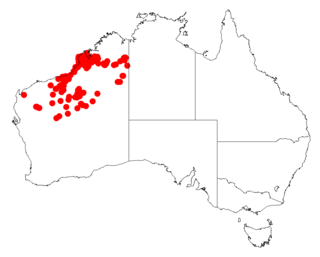
Acacia eriopoda, commonly known as the Broome pindan wattle and the narrow-leaf pindan wattle, is a species of wattle in the legume family that is native to northern Western Australia. It is also known as Yirrakulu to the Nyangumarta peoples.
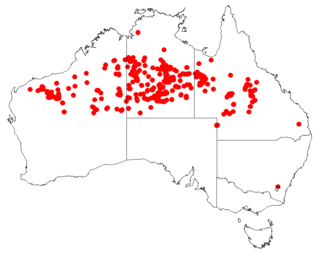
Acacia adsurgens is a shrub belonging to the genus Acacia and the subgenus Juliflorae. It is native to the northern areas of Australia.

Acacia desertorum is a shrub belonging to the genus Acacia and the subgenus Juliflorae that is endemic to western Australia.

Acacia gardneri is a shrub belonging to the genus Acacia and the subgenus Juliflorae native to Western Australia.

Acacia jibberdingensis, also known as Jibberding wattle or willow-leafed wattle, is a shrub or tree belonging to the genus Acacia and the subgenus Juliflorae that is endemic to Western Australia.

Acacia websteri is a shrub or tree belonging to the genus Acacia and the subgenus Juliflorae that is endemic to western Australia.

Acacia basedowii, commonly known as Basedow's wattle, is a shrub belonging to the genus Acacia and the subgenus Phyllodineae endemic to arid parts of central Australia.

Acacia merrickiae is a shrub belonging to the genus Acacia and the subgenus Phyllodineae that is endemic to a small area of south western Australia.

Acacia pulviniformis is a shrub of the genus Acacia and the subgenus Phyllodineae that is endemic to south western Australia.

Acacia validinervia also commonly known as nyalanyalara, nyala nyala, alumaru or blue wattle, is a shrub of the genus Acacia and the subgenus Phyllodineae endemic to arid areas of inland Australia.
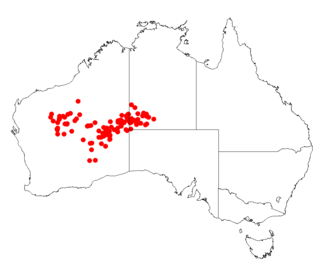
Acacia abrupta is a shrub of the genus Acacia and the subgenus Plurinerves that is endemic to arid parts of central and western Australia.

Acacia chrysopoda is a shrub of the genus Acacia and the subgenus Plurinerves that is endemic to an area of south western Australia.

Acacia chalkeri, also known as Chalker's wattle, is a shrub belonging to the genus Acacia and the subgenus Phyllodineae that is native to parts of eastern Australia.

Acacia alleniana is a shrub or tree belonging to the genus Acacia and the subgenus Phyllodineae endemic to northern parts of Australia.
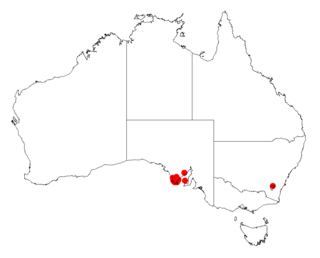
Acacia gillii, commonly known as Gill's wattle, is a shrub belonging to the genus Acacia and the subgenus Phyllodineae that is native to parts of southern Australia.
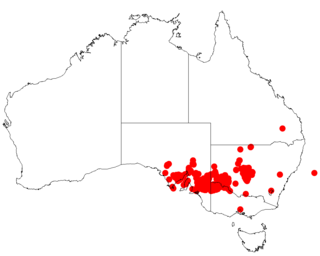
Acacia wilhelmiana, commonly known as dwarf nealie, Wilhelmi’s wattle and mist wattle, is a shrub belonging to the genus Acacia and the subgenus Plurinerves native to the mallee region of central and eastern Australia.

Acacia rivalis, commonly known as silver wattle or creek wattle, is a shrub or tree belonging to the genus Acacia and the subgenus Phyllodineae native to southern Australia.

Acacia semirigida, also known as stony ridge wattle, is a shrub or tree belonging to the genus Acacia and the subgenus Phyllodineae native to north eastern Australia.

Acacia kybeanensis, commonly known as kybean wattle or kybeyan wattle, is a shrub of the genus Acacia and the subgenus Phyllodineae that is endemic to south eastern Australia.

Acacia leptostachya, commonly known as Townsville wattle or slender wattle, is a shrub or small tree belonging to the genus Acacia and the subgenus Juliflorae that is native to north eastern Australia.




















